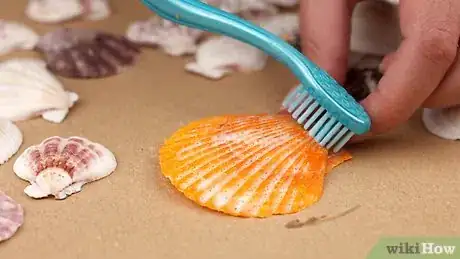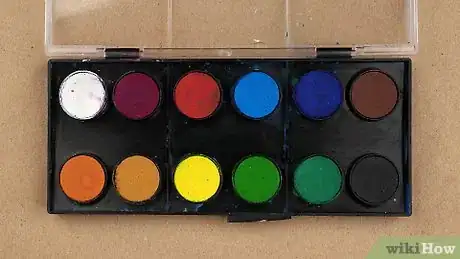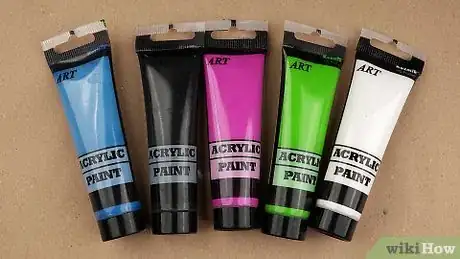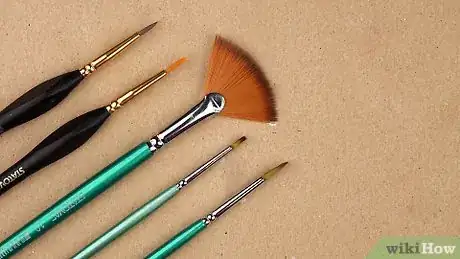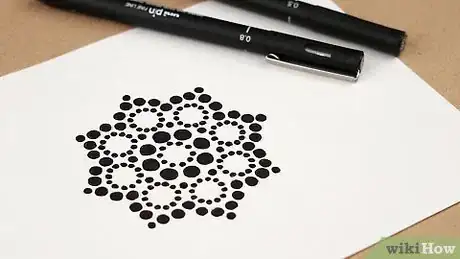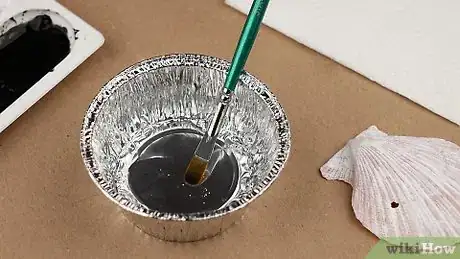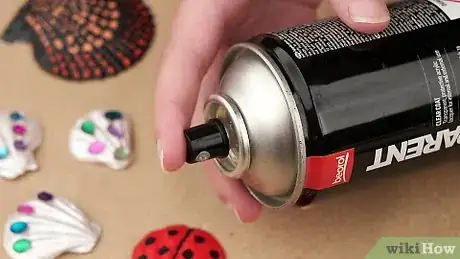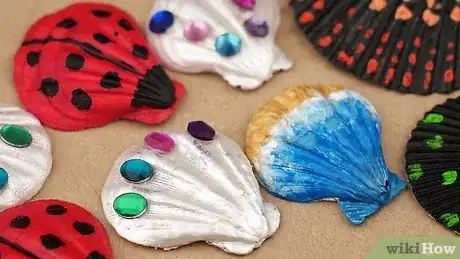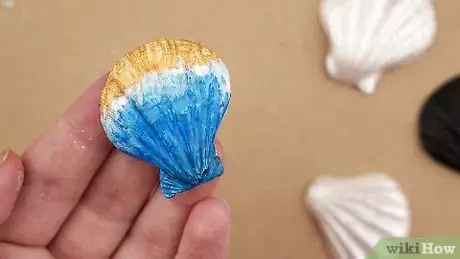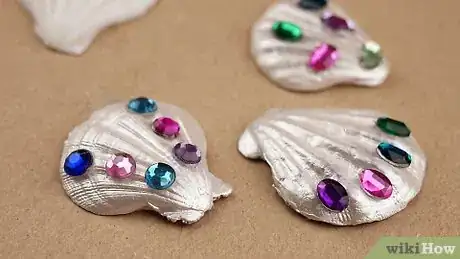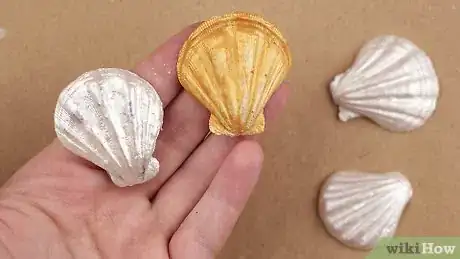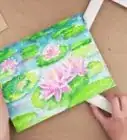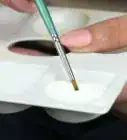This article was co-authored by Joy Cho. Joy Cho is the Founder and Creative Director of the lifestyle brand and design studio, Oh Joy!, founded in 2005 and based in Los Angeles, California. She has authored six books and consulted for creative businesses around the world. Joy has lectured on business, leadership, and entrepreneurship at conferences and companies such as AltSummit, Pinterest, Target, and Hallmark, while her home and studio have been featured in magazines such as House Beautiful, Parents, and Domino. She has also been named one of Time's 30 Most Influential People on the Internet multiple times and has the most followed account on Pinterest with more than 14 million followers.
There are 8 references cited in this article, which can be found at the bottom of the page.
This article has been viewed 120,134 times.
Painted seashells are a way to add dimension and interest to shells that you've collected. While shells are beautiful in their own right, a little decorating can personalize special shells and may be suitable for adorning a craft or art project that you're making.
Steps
Getting Started and Preparing the Shells
-
1Gather and clean the shells. Inspect the shells for any cracks and chips. If you come across any cracks or chipped ones, set them aside for a different project. Any cracks or chips will make create an uneven painting surface, which will make the shell harder to paint. Rinse them using warm water, and scrub them with an old toothbrush or manicure brush. If the shells are very smelly, leave them in a bleach solution for up to 24 hours. Keep in mind that the bleach may also turn the shells pure white.[1]
- If you don't have a beach near you, you can always buy shells from an art store. Some florists may sell also shells as vase fillers as well.
- If you are using store-bought shells, then you don't have to clean them. A simple rinse may be a good idea to get rid of any dust, however.
-
2Consider priming the shell if you plan on painting it a solid color. This is not completely necessary, but it will make the surface smoother to paint on. Choose an acrylic paint primer, and paint both sides of the shell. Let each side dry before adding a second coat.Advertisement
-
3Choose watercolor paint if you want the shell's features to show through. Watercolor is easily absorbed into the shell, and will be translucent when it dries. It will "dye" the shell a new color while allowing the shell's original patterns and designs to show through. It is best for solid-color designs and "tie dye" designs.
- You can also work with liquid water colors. They are more saturated and will give you brighter results. You will need to add a few drops of water to dilute them, however.
-
4Choose acrylic paint for fine designs, scenery, and solid-color designs. Acrylic paint is opaque when it dries, and it will completely cover the shell. You will still see the shell's texture, but you won't see its original color or pattern. Acrylic paint is also great for layered designs, but you will need to let each layer dry first before moving onto the next.
-
5Get a good quality brush. Choose a brush with fine bristles, such as taklon or sable. Avoid brushes that are made with horsehair or boar bristles, as they will leave behind brush strokes. You should also avoid using bushes that have bent or messed-up bristles.
- Consider having an assortment of brushes, such as a flat brush and a fine-pointed, round-tipped brush.
-
6Pick a theme. You can paint just about anything on your shell, from animal faces, to beach scenes, to designs or words. If your scene is very complex, consider practicing it on a sheet or paper first.
- Having an idea of what you want to paint will lessen the chances of making mistakes later on.
Painting the Shells
-
1Dilute your paint with some water. Watercolor paints need to be activated with some water, but even acrylic paints could benefit from a few drops of water. This will make your acrylic paints more fluid and easier to work with.
-
2Work with a wet brush. Before you start painting, dip your brush into a cup of water, and blot it on a piece of paper towel. This will make it easier to paint with and reduce brushstrokes.
-
3Start with the background, and let the paint dry before moving on. Even if you are painting a simple design on your shell, such as a ladybug, you should start with the background color first. This will prevent the paint from mixing and creating a messy, muddy effect.
- If you plan on painting both sides of your shell, let one side dry before turning the shell over and painting the other side.
- If you are covering a large area, use a large flat-tipped brush.
-
4Add the details using a thinner brush. A fine-pointed, round-tipped brush would be ideal for this. If you mess up, don't worry, and keep painting. Depending on the mistake, you can always cover it up with the background color once everything dries.
- Remember to rinse your brush before moving on to a new color.
-
5Consider sealing your shell to protect it. Once you are done, you can cover your shell with a clear, acrylic sealer. You can use either the brush-on type or the spray-on type. A glossy finish is the most popular, but a matte or satin finish can look nice too. The choice is up to you!
- If you painted your shell using metallic or pearlescent colors, use a glossy finish. Matte or satin will take the sparkle away.
- Use caution if you painted your shell using watercolor paints, as the sealer may cause the colors to run. Glossy sealers may also darken your colors, while matte or satin sealers may lighten them.[2]
-
6Display your shell or use it for other projects. You can display your shell on a candle charger, dresser, or even the fireplace mantle. You can also hot glue it to a hairclip and turn it into a cute accessory.
Trying Different Designs
-
1Turn your shells into painted critters. Paint your shell a solid color and let it dry. Then, turn it into a critter by painting designs onto it, or glue on extras, such as cut pipe cleaners and googly eyes.
- Draw a head, a vertical line, and some black spots to make a ladybug.[3]
- Turn your shell into a crab by gluing on two googly eyes to the top/point of the shell, and short, pipe cleaner stems to the back.
- Turn your shell into a fish by gluing a googly eye to the top/point of the shell, and smaller shells to make the fins.[4]
-
2Paint a scene. Ocean scenes are the best, but you can paint any sort of scene you'd like. Start with the sky first, then move onto the background (ie: ocean, mountains, grass, etc). Paint the largest object next (such as houses and trees) and finish off with the details (such as flowers, windows, and birds). Let each layer dry before you move onto the next.
-
3Paint some geometric or zentangle designs. Paint the shell a solid color first, let it dry, then paint some geometric designs, such as zigzags, using a contrasting color. Black and white are classic combinations, but you can try other combinations, such as blue and white, or rainbow on top of black.
-
4Use a thin, pointed brush to make tiny points and mandalas. Paint your shell a solid color first and let it dry, then make lots of tiny dots using the tip of a fine-pointed brush. Try to vary the sizes of the dots, and make them as close together as possible. You can make them all one color, or use different colors to create a striped or radial effect.
-
5Add some bling with glitter and gems. Paint your shell using some pearlescent paint and let it dry. Then, add some glue where you want the glitter or gemstones to go. Add the glitter or gemstones, and let it dry again. Display it someplace where it will catch the sunlight and sparkle.
- Fine, iridescent glitter will work the best for this. You can find it in the scrapbooking aisle of an arts and crafts store.
- Use white glue for glitter, and super glue for gemstones.
- Instead of glitter, try colored sand for some interesting texture!
-
6Paint the shells using metallic gold or silver paint for a sophisticated look. You can paint the entire shell a solid color, or just the edge for something more elegant. You can even paint just one side of the shell, and leave the other side plain.
- If you are painting the entire shell a solid color, you can use spray paint instead. It will be much faster.
Expert Q&A
Did you know you can get expert answers for this article?
Unlock expert answers by supporting wikiHow
-
QuestionCan you paint sea shells with acrylic paint?
 Joy ChoJoy Cho is the Founder and Creative Director of the lifestyle brand and design studio, Oh Joy!, founded in 2005 and based in Los Angeles, California. She has authored six books and consulted for creative businesses around the world. Joy has lectured on business, leadership, and entrepreneurship at conferences and companies such as AltSummit, Pinterest, Target, and Hallmark, while her home and studio have been featured in magazines such as House Beautiful, Parents, and Domino. She has also been named one of Time's 30 Most Influential People on the Internet multiple times and has the most followed account on Pinterest with more than 14 million followers.
Joy ChoJoy Cho is the Founder and Creative Director of the lifestyle brand and design studio, Oh Joy!, founded in 2005 and based in Los Angeles, California. She has authored six books and consulted for creative businesses around the world. Joy has lectured on business, leadership, and entrepreneurship at conferences and companies such as AltSummit, Pinterest, Target, and Hallmark, while her home and studio have been featured in magazines such as House Beautiful, Parents, and Domino. She has also been named one of Time's 30 Most Influential People on the Internet multiple times and has the most followed account on Pinterest with more than 14 million followers.
Designer & Style Expert, Oh Joy!
-
QuestionWhat types of paint should I use for painting shells?
 Community AnswerYou could use watercolor if you want a more subtle tone; if you want a more intense color, you can use acrylic paint.
Community AnswerYou could use watercolor if you want a more subtle tone; if you want a more intense color, you can use acrylic paint. -
QuestionAren't painted shells toxic to most animals?
 Community AnswerYes, but the article doesn't mention putting one in a fish tank or anything.
Community AnswerYes, but the article doesn't mention putting one in a fish tank or anything.
Warnings
- Don't let the paint dry on the bristles.⧼thumbs_response⧽
- Don't let the brush sit in water. This damages the bristles, and loosens the glue holding the bristles in place.⧼thumbs_response⧽
Things You'll Need
- Shells with clean, flat surfaces
- Paintbrushes of good quality
- Acrylic or watercolor paint
References
- ↑ http://allaexpression.com/blog/i-can-to-do-this-seashell-art-myself-artist-explanation-about-working-with-seashells/
- ↑ http://www.goldenpaints.com/technicalinfo_varnwatercolor
- ↑ http://www.stillplayingschool.com/2015/04/seashell-ladybug-craft-kids.html
- ↑ http://craftsbyamanda.com/tropical-seashell-fish-craft/
- ↑ http://www.polkadotchair.com/2013/08/painted-seashell-accessories.html/
- ↑ http://www.polkadotchair.com/2013/08/painted-seashell-accessories.html/
- ↑ http://www.fantasticfunandlearning.com/seashell-painting-art-for-kids.html
- ↑ http://www.fantasticfunandlearning.com/seashell-painting-art-for-kids.html
- ↑ http://www.thekimsixfix.com/2015/05/sea-shell-stamped-pillows.html
About This Article
With a few basic painting supplies, you can paint your seashells with some beautiful designs. It's optional, but consider applying some acrylic primer to your seashells before you paint them since it will help the paint stick better. Use watercolors if you want the shell patterns to show through, or acrylic paint if you just want to see your design. Whichever paint you use, dilute it with a little water and wet your paintbrush before you apply the paint. If you’re painting a few layers, let each layer dry before you add more so the paint doesn’t run. To protect your paint and give it a shiny finish, spray or brush on an acrylic sealer when you’re finished. For design ideas to decorate your seashells and more tips from our Design co-author read on!
